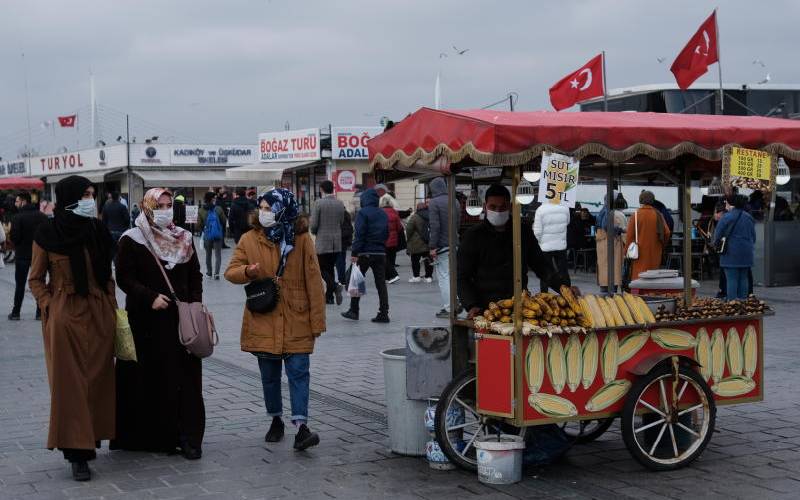 People take a stroll through Eminonu district in
Istanbul, Turkey on March 3. The country is overwhelmingly secular
despite a majority of the population being Muslim. [Reuters]
People take a stroll through Eminonu district in
Istanbul, Turkey on March 3. The country is overwhelmingly secular
despite a majority of the population being Muslim. [Reuters]
Turkey is best known as the beneficiary of the once-mighty Ottoman Empire which crumbled after World War I (WWI).
Thereafter, Turkey became a republic in 1923, with the much-revered Mustafa Kemal Atatürk (1881-1938) as the founding president.
The centre of the Ottoman Empire was Istanbul, whose former name was Constantinople.
The city had flourished during the 1,000 years of the Byzantine empire, a breakaway from the mighty Roman Empire.
The western Roman Empire decayed away as the eastern one, Byzantine, held on for 10 centuries. Istanbul, with a population of about 16 million, is strategically located between Europe and Asia and at the narrow strait of Bosporus that connects the Black Sea to the Mediterranean.
It’s the gateway to Crimea, which is now part of Russia, after annexation from Ukraine. A flight into the city is interrupted by a forest of ships passing through the strait of Bosporus, into or out of the Black Sea. Few sea lanes are this busy.
Bulgaria, Romania, Moldova, Russia, Ukraine and Georgia are all accessible by sea through Bosporus. An epic battle during WWI over the straight involving Australian forces further reinforces the strategic location of Istanbul.
It seems 100 years since its founding, Turkey is becoming a regional powerhouse.
The country’s hand is seen in the Syrian civil war, the Azerbaijan-Armenia war, the Libyan conflict and nearer home in Somalia. It also has influence over Qatar, Iraq and Afghanistan. Many Turks live in Germany; they got there after WWI to help in post-war recovery, just like the Jamaicans in the UK.
Some reckon the failed 2016 coup drove Turkey into a new direction beyond its borders.
Could Turkish President Recep Tayyip Erdogan be looking to exploit the vacuum created by President Trump’s withdrawal of American troops from the Middle East, including Afghanistan?
Turkey is expanding on the economic front too. Many travellers are likely to have flown Turkish Airlines through Istanbul where the national airport is under expansion. Who has not heard of carpets from Turkey or their schools’ franchise Light Academy, clothing brand LC Waikiki and Do?ta? furniture stores?
The composition of the Turkish economy in 2019 showed evidence of industrialisation.
At the time, agriculture contributed 6.43 per cent to GDP, industry 27.71 per cent and services 55.91 per cent. Compare that with Kenya.
Turkey has lately become a hub of medical services, with many patients diverting from India to Turkey. One media report indicated that former senator Yusuf Haji was hospitalised in Turkey.
Though language and visa wait can be long, the shift to Turkey is real. Another growing destination for medical services is Israel. Turkey and Israel combine medical services with religious beliefs. Remember Jerusalem is a holy city. Think of a patient also praying at the wailing wall in Jerusalem or visiting Mt Ararat, the legendary site of Noah’s Ark. That thinking dovetails with our missionary centres that had churches, schools, hospitals, water and other amenities. Patients from Turkey and Israel bring back “holy water,” which they share and in some extreme cases sell it. And there was once Loliondo in neighbouring Tanzania. Growth in the number of Kenyans seeking medical services abroad has grown to the extent that regulators have come into play.
One hopes local doctors are not trying to protect their market from foreign competition. My stand is that patients should have choices on where to get medical attention. If we want patients to remain here, let us improve medical services. Protectionism will stifle creativity, raise prices and lower quality.
What attracts Kenyan patients abroad beyond prestige? It could be lower cost, perceived quality and ease of access through Turkish Airlines, the same way we go to Dubai through Emirates.
We can’t rule out some “brokerage.” What do visitors come to do in Kenya beyond tourism?
There is no debate, Turkey’s influence is on the rise. Though a Muslim country, it’s very secular, a possible legacy of straddling Christian Europe and Muslim Asia. I found enough evidence of this secularism on a recent visit to Istanbul.
Turkey is a member of the North Atlantic Treaty Organisation (Nato), which makes her forays abroad more curious. She seems to have an ally, Russia, which helped turn the tide of the civil war in Syria.
Is Turkey positioning itself to be a regional power in the Middle East? Could it be a counter veiling force to ambitious Iran? Turkey’s population of 82 million gives it more clout.
- The writer is an associate professor at the University of Nairobi




No comments :
Post a Comment